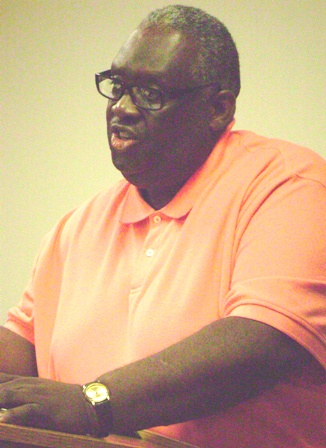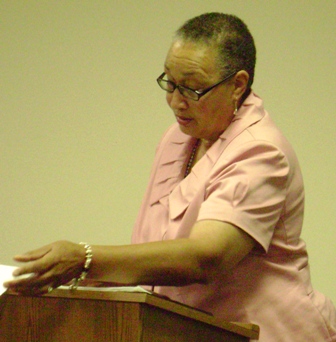|
 NOLSW members in Mississippi attended the North Mississippi Rural Legal Services (NMRLS) Board of Directors (Board) meeting on July 9, 2011 to protest proposed cuts to legal services in Northern Mississippi. A committee charged by the Board to develop proposals to reduce the $309,000 deficit recommended totally eliminating the already pared down Administrative Law unit, except for unemployment cases, and closing the Tupelo office. NOLSW members in Mississippi attended the North Mississippi Rural Legal Services (NMRLS) Board of Directors (Board) meeting on July 9, 2011 to protest proposed cuts to legal services in Northern Mississippi. A committee charged by the Board to develop proposals to reduce the $309,000 deficit recommended totally eliminating the already pared down Administrative Law unit, except for unemployment cases, and closing the Tupelo office.
Unit Chairperson, William Young (pictured on right) told the Board of Directors that eliminating the Administrative Law unit would mean that clients would be forced to hire private attorneys for Social Security and disability cases. If clients have to hire private attorney to get Social Security and disability benefits, these clients, who are already at the lowest incomes would have to pay 25% of whatever they win to an attorney. If NMRLS handled the case, the client would have to pay nothing. Additionally, there are several types of Social Security and disability issues, where private attorneys cannot recover fees. These clients would have nowhere to go for representation.
Closing an office in a rural program will cause clients to have to travel over 100 miles to a legal services office. Tupelo City Councilwoman Nettie Davis, (pictured below) who represents the area where the Tupelo office is located, implored the Board of Directors to not close the Tupelo office. She offered to find city offices for the program to use that would not cost NMRLS anything.
 At that same meeting, Ben Cole, NMRLS Executive Director, asked the Board of Directors to authorize him to bargain with the union over the employees’ portion of health care premiums. Cole wants the union to agree to gradually increase employees’ portion of their dependent health insurance premiums until they are paying 100% of dependent care premium. Union Chairperson, William Young, told the board emphatically “No!” Employees’ salaries at NMRLS are already very low and they have not received any salary increase in the last several years. Any increase that employees have to pay for dependent care is tantamount to a pay cut. A management attorney told the Board that if she had to pay the total premium for dependent care, it would amounts to a $6,000 pay cut for her. At that same meeting, Ben Cole, NMRLS Executive Director, asked the Board of Directors to authorize him to bargain with the union over the employees’ portion of health care premiums. Cole wants the union to agree to gradually increase employees’ portion of their dependent health insurance premiums until they are paying 100% of dependent care premium. Union Chairperson, William Young, told the board emphatically “No!” Employees’ salaries at NMRLS are already very low and they have not received any salary increase in the last several years. Any increase that employees have to pay for dependent care is tantamount to a pay cut. A management attorney told the Board that if she had to pay the total premium for dependent care, it would amounts to a $6,000 pay cut for her.
At the end of the meeting, the Board voted to table the vote until after August 15, 2011 in order to consider additional options for reducing the deficit. The Union members are preparing their own version of a deficit-reduction plan.
|